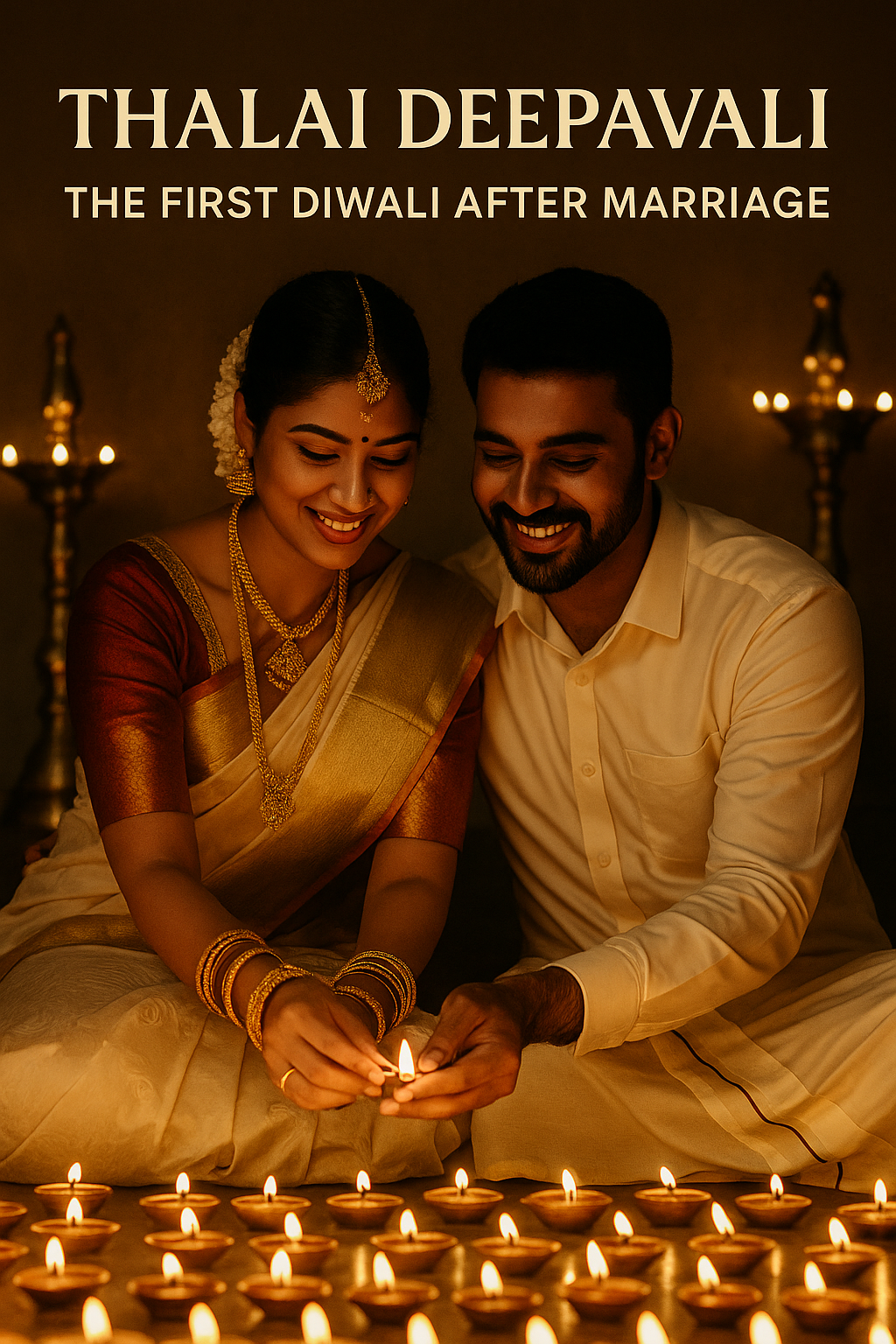Introduction
India is a land of countless traditions and festive colors. While Diwali in North India focuses on Goddess Lakshmi’s blessings and prosperity, South India celebrates it with deep cultural and emotional significance.
One of the most beautiful and unique traditions from the South is Thalai Deepavali — the first Diwali after marriage, observed mainly in Tamil Nadu.
This sacred celebration marks the couple’s new journey together, blending devotion, family blessings, and love.
What is Thalai Deepavali?
In Tamil, the word “Thalai” means first, and “Deepavali” means festival of lights.
So, Thalai Deepavali literally translates to “The First Diwali” — the first festival of lights celebrated by a couple after their wedding.
It is a symbol of joy, unity, and new beginnings. The newlywed couple receives blessings, gifts, and love from both families. For many, it’s not just a festival — it’s an emotional moment marking the couple’s first step into a shared life.
Thalai Deepavali is a unique Diwali custom of which Indian state?
👉 Tamil Nadu
Thalai Deepavali is predominantly celebrated in Tamil Nadu, and to some extent in Karnataka and Kerala.
In Tamil Nadu, it is one of the most cherished family festivals. On this day, the newly married couple celebrates Diwali together for the first time in the husband’s home, surrounded by love, rituals, and blessings.
Spiritual Significance of Thalai Deepavali
In Tamil tradition, Diwali commemorates the victory of Lord Krishna over the demon Narakasura.
This victory symbolizes the triumph of light over darkness — both externally and within.
For a newly married couple, Thalai Deepavali represents the same philosophy: moving from individual lives into the light of togetherness, understanding, and prosperity.
It reminds couples that marriage, like Diwali, is not just about celebration, but about nurturing light, patience, and love in each other’s lives.
Traditional Rituals of Thalai Deepavali
1. Preparation Before the Festival
- Families begin preparations days in advance.
- The bride’s in-laws arrange traditional sarees, gold jewelry, and gifts.
- Homes are cleaned, decorated, and filled with the fragrance of flowers and oil lamps.
- Sweets and snacks like Adhirasam, Murukku, Ladoo, and Pongal are prepared.
2. The Morning Ritual
- The day begins with an early oil bath (Abhyanga Snanam) before sunrise — a sacred cleansing ritual.
- Couples wear new traditional attire — silk saree for the bride and veshti for the groom.
- The family gathers for Lakshmi and Krishna Puja, offering prayers for prosperity and happiness.
- After the puja, elders bless the couple with gifts, jewelry, and good wishes.
3. Lighting the Diyas (Deepam)
The couple lights the first set of diyas together in the home temple.
This act represents the beginning of their journey filled with divine blessings and unity.
4. Family Feast and Gift Exchange
- A grand meal follows the rituals, including sweets, rice dishes, and coconut delicacies.
- Relatives visit to bless the newlyweds and exchange gifts.
- The day is filled with music, laughter, and fireworks in the evening — symbolizing the joy of new beginnings.
Cultural and Emotional Importance
Thalai Deepavali is not merely a custom — it is a cultural celebration of love and family unity.
It reflects the South Indian value of togetherness, where marriage is not just between two people but between two families.
- It strengthens the bond between the bride and her in-laws.
- It welcomes the bride into her new home with warmth and respect.
- It reminds the couple to walk their spiritual journey with light and love.
Even today, families in Tamil Nadu travel long distances to celebrate Thalai Deepavali together, keeping this beautiful tradition alive.
Modern Relevance
In modern times, Thalai Deepavali continues to hold great emotional value. Even couples living in cities or abroad make it a point to celebrate it — sometimes virtually, sometimes by returning home.
Social media has amplified its cultural importance, with many young couples sharing photos and stories under hashtags like #ThalaiDeepavali and #FirstDiwaliTogether.
It has become a symbol of both cultural pride and love in the modern era.
Simple Thalai Deepavali Puja Steps
- Wake up before sunrise and take an oil bath.
- Wear traditional new clothes.
- Offer prayers to Lord Vishnu, Goddess Lakshmi, and Lord Krishna.
- Light diyas together as a couple.
- Offer sweets, fruits, and flowers to deities.
- Seek blessings from elders and exchange gifts.
- Enjoy a family feast and celebrate together.
Puja Essentials for Thalai Deepavali
| Item | Significance |
|---|---|
| Oil Lamps (Deepam) | Symbol of light and divine union |
| Flowers (especially Jasmine) | Purity and auspiciousness |
| Gold or Silver Coin | Symbol of wealth and prosperity |
| Sweets and Fruits | Celebration of abundance |
| Til Oil and Turmeric | Purification and protection |
Regional Variations and Comparisons
| State | Special Diwali Custom |
|---|---|
| Tamil Nadu | Thalai Deepavali – first Diwali after marriage |
| Karnataka | Naraka Chaturdashi and early morning oil bath |
| Kerala | Family reunion and oil lamps |
| Maharashtra | Abhyanga Snanam and sweets exchange |
| North India | Lakshmi Puja and Dhanteras shopping |
This diversity shows how Diwali unites India — each region adding its own flavor of faith and joy.
Symbolism Behind Thalai Deepavali
At its heart, Thalai Deepavali symbolizes:
- The light of new beginnings in a couple’s life.
- The blessing of elders as a form of divine grace.
- The union of two souls and two families.
- The importance of starting married life with faith, gratitude, and positivity.
It reminds us that even in modern times, the essence of Diwali — illumination of heart and home — remains timeless.

